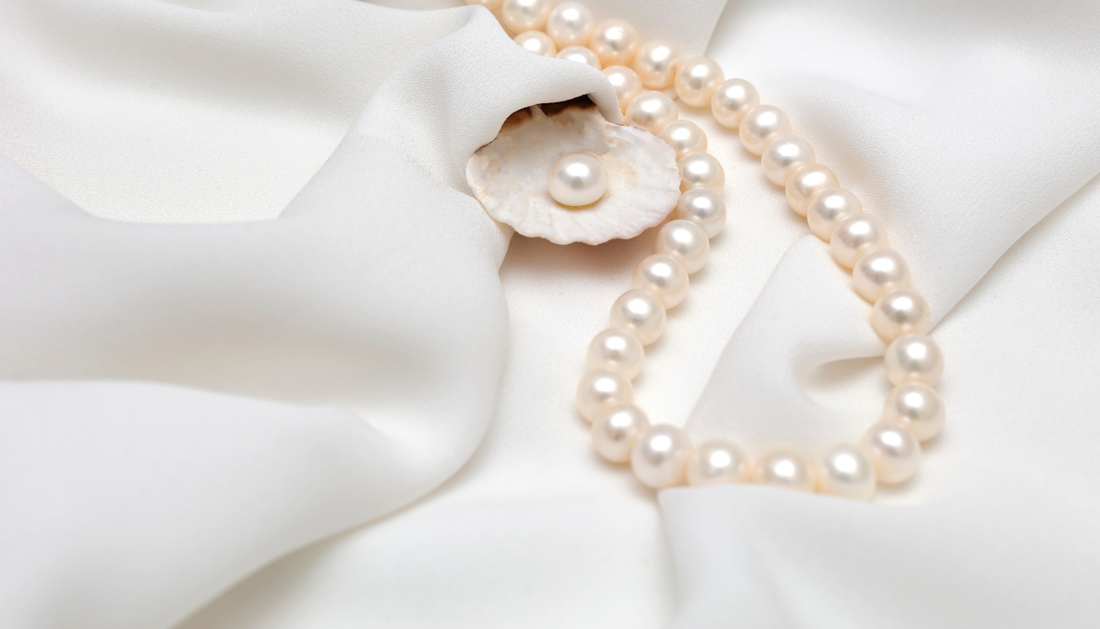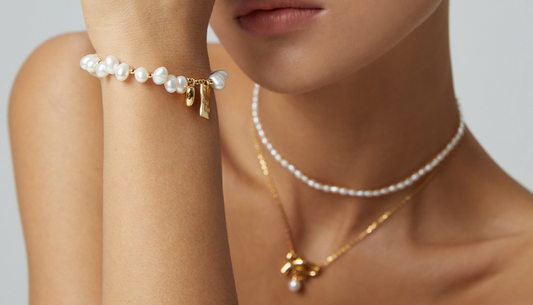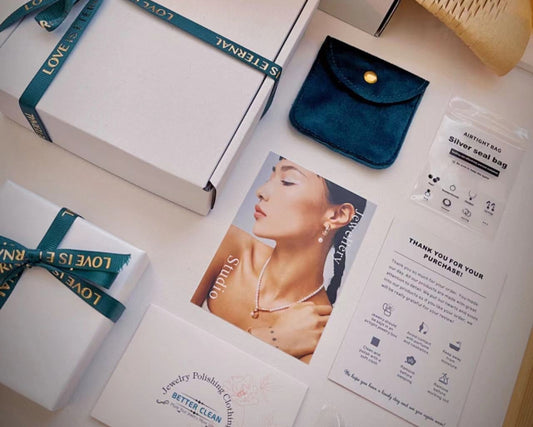
How to Protect Your Pearl Jewelry from Tarnish Scratches and Damage?
Pearls are delicate and glow with a soft light. To keep your pearl jewelry looking great, start with the right care. This guide will show you how to protect your pearls from damage.

Keeping your pearls in top shape is easy. Just wipe them gently with a soft, damp cloth after each wear. Don't soak them or use harsh cleaners. Store your pearls in soft pouches in a cool, dark place.
Every little action helps. Keep each piece separate to avoid scratches. Store them flat and use silica gel nearby but not touching the pearls. Regular cleaning and timely restringing will keep your pearls looking new.
Understanding Pearl Sensitivity and Why Pearls Need Special Care
Pearls are different from mined stones. Their shine comes from layers of nacre that react to their surroundings. Taking care of pearl jewelry, knowing how nacre works, helps keep it shining for years.
Proper pearl care is simple. Avoid harsh products, keep away from heat, and store in well-ventilated places. These steps are key for both freshwater and baroque pearl care.

Organic gemstones and nacre vulnerability
Pearls are made of soft aragonite platelets held together by proteins. This makes them more delicate than quartz or sapphire. Even dust can scratch them, and rubbing can dull their surface.
Nacre also weakens with acids and alcohols. Things like perfume, hairspray, and lotion can harm the outer layers. That's why it's best to gently wipe pearls after wearing them.
Sensitivity to moisture, temperature, and chemicals
Changes in moisture can be a problem. Too dry air might cause tiny cracks, while too much humidity can cause color changes. Freshwater pearls do best in steady, breathable conditions.
Extreme temperatures can also harm nacre. Keep pearls away from heaters, car dashboards, and direct sunlight. Avoid using ammonia, bleach, and rough cloths to keep them looking good.
Ideal environment: stable 60–70°F and moderate humidity
Store pearls in a place with a stable temperature of 60–70°F and moderate humidity. A closet or drawer away from windows and vents is ideal. This rule applies to all pearl types, including baroque, to prevent grime buildup.
Use soft, breathable pouches or a fabric-lined box for storage. This helps keep the nacre layers intact and the pearls shining.
| Factor | Risk to Nacre | Better Choice | Why It Works |
|---|---|---|---|
| Fragrance, hairspray, lotion | Chemical erosion and dulling | Apply products first, pearls last | Limits contact with acids and alcohols to maintain pearl jewelry |
| Dry air or high humidity | Cracking or discoloration | Moderate, breathable storage | Fresh airflow supports freshwater pearl care and reduces moisture stress |
| Heat, UV, rapid temperature shifts | Structural stress and fading | Stable 60–70°F, shaded space | Steady conditions protect luster for baroque pearl maintenance |
| Abrasive cloths and harsh cleaners | Scratches and etched surfaces | Soft, damp, lint-free wipe | Gentle contact preserves the outer nacre and supports proper pearl care |
Pearl Jewelry Care, Store Pearl Necklace, Pearl Maintenance Tips
These pearl care tips are simple and help keep your jewelry looking great for years. Follow them daily to clean your pearls gently and keep them shining.

Put pearls on last and take off first
Always put pearls on last and take them off first. Apply skincare, makeup, and hair products first. Then, wear your pearls. This keeps your pearls safe during busy days.
Wipe with a soft, damp, lint-free cloth after each wear
Wipe your pearls with a soft, damp cloth after each wear. This removes sweat and oils. It's a simple step that keeps your pearls clean and safe.
Avoid perfumes, lotions, hairspray, sweat, and harsh cleaners
Stay away from sprays, heavy lotions, and sweat. Avoid alcohol-based cleaners and harsh agents. These tips help keep your pearls looking their best.
Never submerge or use ultrasonic/steam cleaners
Never soak your pearls in water. Avoid using ultrasonic or steam cleaners. Instead, gently wipe them with a cloth before storing.
| Habit | Why It Matters | How to Apply |
|---|---|---|
| Last on, first off | Limits chemical and heat exposure | Dress pearls after products set; remove before undressing |
| Post-wear wipe-down | Removes oils that dull luster | Use a soft, damp, lint-free cloth; air-dry fully |
| Avoid harsh products | Prevents nacre erosion and residue | Keep away from perfumes, lotions, hairspray, and sweat |
| No soaking or machines | Protects threads and adhesives | Never submerge; avoid ultrasonic or steam cleaners |
How to Clean Pearls Safely: A Professional Pearl Cleaning Guide
Use gentle methods to protect the nacre and keep the pearls shiny. This guide shows how to clean pearls at home safely. You can care for your pearl jewelry without worrying about damage. Follow these steps to keep your pearls looking great for a long time.
Daily wipe-down to remove oils and residues
Wipe your pearls with a soft, damp, lint-free cloth after each wear. This removes oils, sweat, and dust that can dull them. Use only clean water on the cloth to keep the nacre safe.
Hold each pearl strand flat and wipe along the curve with the cloth. Let it air dry on a clean towel. This daily routine is key to keeping your pearls in top condition.
Spot-clean with minimal water; dry fully before storing
For tough spots, dampen a cloth corner with a few drops of water. Clean only the affected area. Never soak your pearls, as excess water can damage the stringing.
After cleaning, pat the pearls dry with a dry cloth section. Let them dry completely before storing. This careful method helps keep your pearls in perfect shape and luster.
What to avoid: abrasives, ammonia, bleach
Stay away from abrasive pads or powders that can scratch the nacre. Avoid using ammonia, bleach, or high-pH cleaners, as they harm the surface. Don't use ultrasonic or steam devices, as they can break the nacre and damage the silk.
These precautions are key to any pearl cleaning guide. Use gentle tools and neutral water to care for your pearl jewelry with confidence.
Best Way to Store Pearls: Prevent Pearl Tarnish and Avoid Pearl Scratches
Every day, choose storage that supports proper pearl care. The best way to store pearls balances airflow, softness, and stable conditions. This keeps the nacre smooth and bright. These habits help prevent pearl tarnish and avoid pearl scratches while you store pearl necklace strands and individual pieces.
Choose breathable, soft storage (silk or cotton pouches)
Use silk or cotton pouches to cushion each piece. These fibers are gentle, reduce friction, and help avoid pearl scratches. Slip clasps and metal parts into a small corner of the pouch to keep them from rubbing the nacre.
Avoid airtight plastic; allow gentle airflow
Skip zip-top plastic and sealed containers. Trapped humidity can dull luster and hinder proper pearl care. Gentle airflow is the best way to store pearls because it supports their natural moisture balance and helps prevent pearl tarnish.
Store in a cool, dark location away from sunlight and heat
Keep pearls in a closet or drawer away from radiators and windows. Aim for a steady 60–70°F with moderate humidity to protect luster. This approach reduces risk of cracking, discoloration, and heat damage while you store pearl necklace pieces safely.
Keep each piece separate to prevent friction and tangling
Place each item in its own pouch or compartment so pearls do not rub against metal or harder gems. Lay necklaces flat to protect silk threads and avoid pearl scratches. Check cases and liners regularly to ensure proper pearl care over time.
| Storage Choice | Why It Works | Best Practice | Risk If Ignored |
|---|---|---|---|
| Silk or cotton pouch | Soft fibers cushion nacre and reduce friction | Place each piece in its own pouch | Scuffs and micro-abrasions from hard surfaces |
| Fabric-lined jewelry box | Compartments separate pieces to avoid tangling | Lay strands flat; close lid to block light | Knotted strands stretch; luster fades in light |
| Breathable environment | Gentle airflow helps prevent pearl tarnish | Avoid airtight plastic and sealed bags | Moisture buildup causes dullness and odor |
| Cool, dark location | Stable 60–70°F preserves luster and color | Store away from heaters and sunny windows | Heat and UV can crack or discolor pearls |
| Separate from metals and gems | Prevents harder materials from scratching nacre | Use dividers or individual pouches | Visible scratches and worn spots on surfaces |
Ideal Storage Materials and Containers for Proper Pearl Care
Storing pearls right means using soft, breathable materials and controlling moisture. Follow simple steps to keep pearls shiny and prevent tarnish. These tips help you care for pearl necklaces and bracelets.
Soft cloth pouches to cushion delicate nacre
Use pouches made of silk or cotton to protect each pearl. These materials gently hold the pearls and keep them safe from scratches. Store each piece in its own pouch to avoid tangles and tarnish.
Fabric-lined, non-tarnish jewelry boxes with compartments
Opt for a box with soft fabric lining and separate sections. This setup is great for pearls because it keeps them away from metals and other pearls. It also makes daily care easier.
Use silica gel nearby for moisture control (not touching pearls)
Keep silica gel packets near your jewelry box to control humidity. Make sure they don't touch your pearls. Replace them as needed to keep your pearls safe.
Replace worn pouches and check interiors regularly
Check pouches and box linings for dust and damage. Replace anything that's worn out. Store your box in a cool, dark place to keep your pearls looking their best.
How to Store Pearl Necklace and Protect Pearl Earrings During Daily Wear
Store necklaces flat in a fabric-lined compartment or a silk pouch. This prevents the silk thread from stretching. Avoid hanging knotted strands for long, as gravity can weaken the knots.
Keep pearls away from metal chains and hard gemstones. This prevents scuffs on the nacre.
Daily habits matter. Put earrings on after makeup, perfume, and hairspray. This protects them from residue. After wearing, wipe each piece with a soft, damp, lint-free cloth. Let it air-dry before storing.
Use individual, soft-lined compartments or small silk pouches for earrings. This prevents backs and settings from rubbing. Store in a cool, dark place with gentle airflow. Avoid humid spots like bathrooms.
When storing pearl necklace strands, ensure knots are snug and even. Separate pearls from bracelets with crystals or diamonds to prevent friction. Store in a breathable case or drawer. Check pieces monthly to keep your pearl jewelry in top condition.
Avoiding Common Mistakes That Damage Pearls
Small habits can make a big difference in caring for pearl jewelry. Follow clear instructions to keep your pearls looking great. This includes avoiding scratches and tarnish in your daily life.
Skipping the post-wear wipe-down
Always wipe pearls with a soft, damp cloth after wearing. This removes sweat and oils that can dull them. Regular care keeps your pearls shining.
Storing in bathrooms or humid, sunny areas
Don't store pearls in bathrooms or near windows. Heat, UV, and humidity can damage them. Store pearls in a cool, dark place for best care.
Using abrasive cloths or chemical cleaners
Stay away from harsh cleaners and abrasive cloths. They can scratch or damage the pearl's surface. Use a soft cloth and gentle cleaners to keep your pearls safe.
Hanging knotted strands long-term; lay necklaces flat
Don't hang knotted necklaces for storage. The weight can harm the silk and knots. Instead, lay them flat in a lined compartment. Use breathable pouches to keep your pearls safe.
Regular Pearl Maintenance: Restringing, Inspections, and Long-Term Care with LUNAROSE
Regular checkups are key to keeping your pearls in top shape. Look for signs like frayed silk, stretched knots, or discoloration. Also, check for loose clasps. If you wear your pearls a lot, they might need to be restrung.
Store them flat between wears to avoid stress. LUNAROSE follows strict standards for freshwater and baroque pearls. This helps keep your jewelry looking great for years.
Creating a cleaning schedule is easy. After each wear, gently wipe your pearls with a soft, damp cloth. For spot cleaning, use a little water but dry them completely before storing. Avoid harsh cleaners like ammonia and bleach.
These steps help keep your pearls shiny and strong. Cleaning them right is all about gentle care.
For storage, use breathable silk or cotton pouches. Keep them in a cool, dark spot at 60–70°F. Make sure each piece is separate to prevent rubbing. LUNAROSE suggests checking your storage materials often and replacing them when needed.
By following these tips, your pearls will stay bright and secure. LUNAROSE's guidance ensures you clean your pearls correctly. This way, every strand is ready for its next appearance.
FAQ
How can I protect my pearl jewelry from tarnish, scratches, and damage?
Always put pearls on last and take them off first. Keep them away from heat, sunlight, and chemicals. Wipe them with a soft, damp cloth after each wear.


